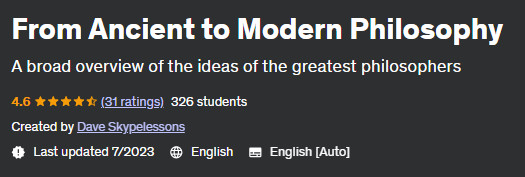Description
From Ancient to Modern Philosophy course. This series of lectures covers the main claims of Western philosophers in chronological order, beginning with the pre-Socratic era and ending with the philosophers of the 20th century. More and more lessons will be added in the future. I am a passionate student of philosophy who enjoys discussing and sharing these ideas with others. There are no tests or assignments in this course, but there are 15 hours of lectures (so far). Although only fragments of the writings of the Pre-Socratics survive, we can still trace a logical evolution in their thought that began with the world of being and becoming and ended with Democritus’s “Atoms and Void.” which can be said to be the basis of modern chemistry. The Stoics, Cynics and Epicureans flourished in later periods in Greece and Rome and developed ethical systems based on the ideas of earlier thinkers. Plato wrote his “Republic” around this time, which has had a greater influence than any other philosophical work, so we review the ideas of this book in great detail. Aristotle was a student of Plato, but he developed a different metaphysical system. His system was greatly admired by Thomas Aquinas, who modified his ideas to support his own Christian beliefs. Two philosophers, Machiavelli and Hobbes, are perhaps the founders of modern political philosophy, so we will examine their work next. The father of modern philosophy, René Descartes, developed a form of rationalism and had a tremendous impact on mathematics and the scientific revolution. The rationalism of Descartes, Spinoza and Plato argued that the main source of all knowledge should be sought in analogical reason. In contrast, the British empiricists (Bacon, Locke, Berkeley, Hume) claimed that the only source of knowledge is acquired through the senses. While Bacon and Locke argued that there must be a real world that gives rise to our perceptions (realism), Berkeley claimed that our perceptions are all we have (idealism). In an attempt to address the arguments of realists and idealists, Kant created a new system that he called “transcendental idealism.” Schopenhauer was a great admirer of Kant’s ideas about time and space, but he suggested that Kant’s famous “thing-in-itself” was somehow knowable, and he introduced the “will” as a “thing-in-itself.” Nietzsche took Schopenhauer’s “will” and turned it into the “will to power,” while Freud considered it the “will to pleasure.” In the 20th century, Heidegger arrived and ushered in a new era of existentialism.
What you will learn in From Ancient to Modern Philosophy course
-
Gain an understanding of the development of thought in Western society over the past 3,000 years
-
Develop a thorough understanding of the basic principles of various philosophical systems
-
Gain an understanding of the fundamentals of the most influential thinkers.
-
Create awareness of those philosophical questions that still remain unanswered
-
Cultivate your approach to some of the most difficult philosophical issues.
This course is suitable for people who
- For anyone who wants an overview of the main principles of the main philosophers.
Characteristics of the course From Ancient to Modern Philosophy
- Publisher: Yudmi
- teacher: Dave Skype Lessons
- Training level: beginner to advanced
- Training duration: 14 hours and 49 minutes
Headlines of the course From Ancient to Modern Philosophy on 7/2023
Prerequisites of the course From Ancient to Modern Philosophy
- No requirements, other than a passionate commitment to learning, questioning, and discovering.
Course images

Sample video of the course
Installation guide
After Extract, view with your favorite Player.
Subtitle: None
Quality: 720p
download link
File(s) password: www.downloadly.ir
Volume
19.8 GB